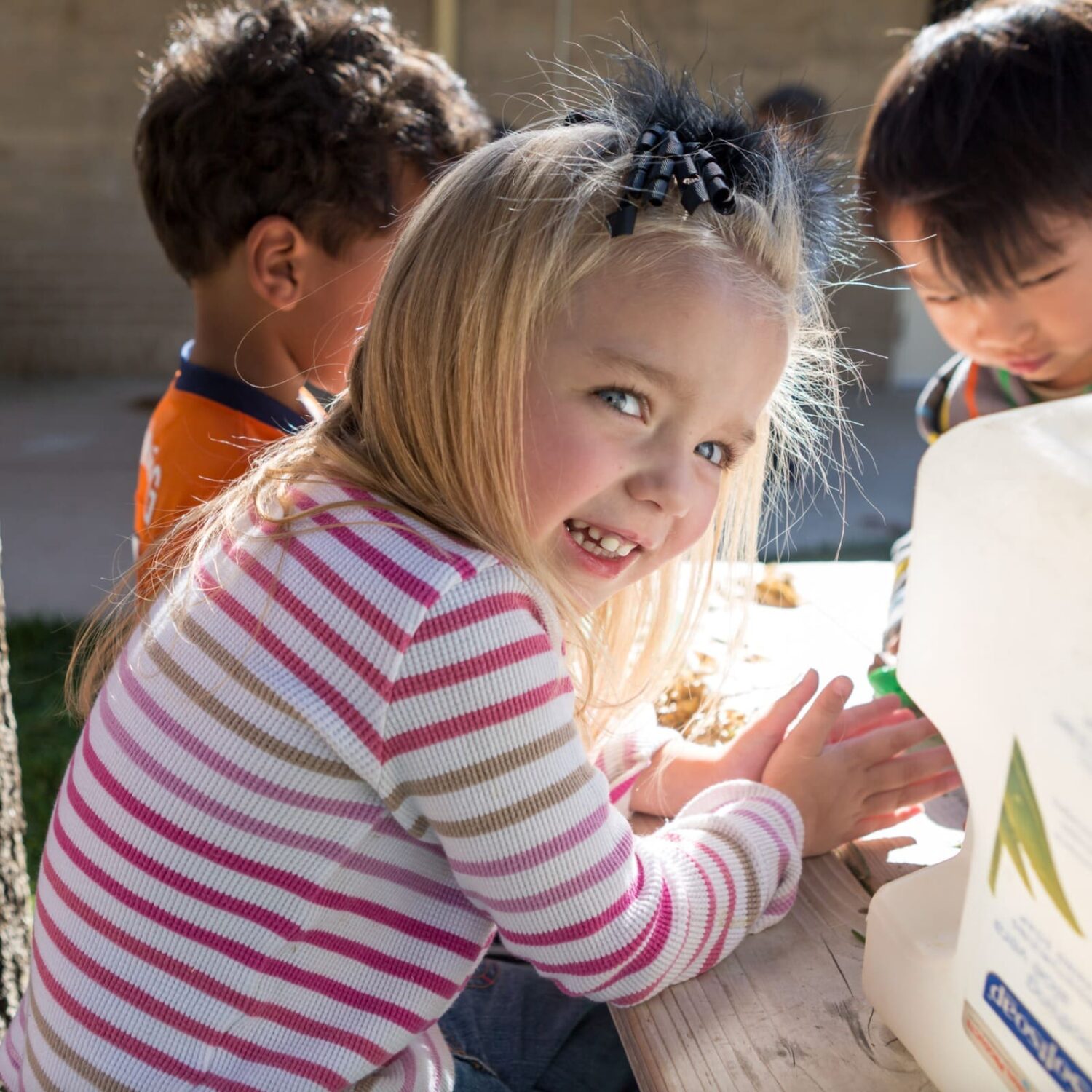Request for Proposals
Child Care Narrative Grants
This RFP seeks to explore the impact child care has on Coloradans through innovative story & data collection, journalism, content creation and evaluation. Proposals are due Aug 3.
Child Care narrative Grant RFP

Why are we focusing on child care?
The data tells us that Colorado’s child care system is in crisis.
The cost of child care averages 37.9% of household income for the typical Colorado family with an infant and a 4-year-old. On average, parents are paying $13,000 to $20,000 a year per child on child care. And despite families paying some of the highest tuition rates in the country, Colorado child care providers struggle to break even due to high and increasing operational costs. Meanwhile, the child care workforce declined sharply after the pandemic and has not kept pace with demand primarily due in large part to low average wages across the field.
These systemic pressures are causing families to leave the workforce or forgo having children, contributing to a $2.7 billion annual hit to Colorado’s economy. And that’s to say nothing about our kids missing out on the opportunity to receive high quality early childhood education in the years from 0-3, which are some of the most crucial for social, emotional and brain development.
There is growing public concern about our overpriced and underfunded child care system, but there is no consensus about who bears the burden of fixing it. What’s more, early stakeholder research reveals a consistent narrative — “parents had the child, so parents must find a way to pay for child care” — but this stance does nothing but perpetuate the status quo.
As clear as this narrative has been, it’s also clear that there is growing and rare levels of bipartisan support for the idea of improving how we provide child care in the U.S. — and why it matters for all of us. This is why Gary Community Ventures seeks to elevate public understanding about the issues facing our child care system and drive support for sustainable solutions.
This request for proposals represents an effort to explore the impact that child care has on all Coloradans through innovative story & data collection, journalism, content creation and evaluation.
*We may issue a grant or a contract based on the organizational structure of selected applicants.
RFP Description
And who we’re inviting to apply
Gary Community Ventures is seeking grant and contract proposals from:

Throughout this RFP process, we will be deeply committed to protecting the editorial independence as well as the journalistic and artistic control of all grantees and contractors. We will work side by side with trusted and award-winning journalists, arts institutions and trusted community organizations to issue these awards as well as offer support for selected recipients over the six-to-12-month grant/contract period.
We aim to build a portfolio of grantees and contractors focused on a series of narrative themes, priority audiences and objectives. The focus areas were the result of an intensive RFP design session that included statewide early childhood experts, award-winning journalists, filmmakers, and creatives as well as members of communities who have not been frequent recipients of messages and stories about the issues facing our child care system but are still deeply impacted by them.
Narrative Themes, Priority Audiences & Key Objectives
We are looking for proposals from individuals, organizations and collaborators committed to:
- Creating and distributing content over a six-to-12-month period
- Exploring one or more of these narrative themes
- Reaching one or more of the priority audiences outlined below
- Accomplishing the following key objectives
Everyone Relies on Someone Who Relies on Child Care: Essential businesses, services and their employees are some of the most deeply impacted by the issues facing our child care system. We will prioritize proposals capable of surfacing narratives and stories that explore how a strong, affordable child care system might support all Coloradans’ ability to access the essential services we rely on to fuel our way of life and our economy. These essential services and employees may include but are not limited to hospitals and health care providers, first responders, active military, educators as well as business owners and employees who operate our food, transportation and manufacturing systems.
Made Possible by Child Care: Our child care crisis is also impacting cherished institutions and activities in our communities that make life worth living in Colorado, including our restaurants, museums, theaters, music venues, parks, recreation and outdoor activities as well as sporting teams and events. We will prioritize proposals that explore how the child care ecosystem helps make it possible for all Coloradans to enjoy the things we love.
Child Care Champions: Early childhood educators are infrequently celebrated, and we are interested in highlighting the often overlooked and vital work they do to support our children in their crucial earliest years of life. Additionally, there are some unexpected stakeholders beginning to champion the importance of these educators and our child care system, and we will prioritize proposals that seek to engage these stakeholders, including military leaders, business owners, religious leaders, conservative messengers as well as elected officials and government employees who are breaking with traditional approaches to explore innovative new solutions to the issues facing our child care system.
Proposals should engage one or more of the following priority audiences, who tend to be less familiar with the issues facing our child care system and how these issues are impacting all Coloradans. Please note that these priority audiences — as well as the descriptions of potentially relevant narratives for each audience — were identified through early stakeholder research from Gary Community Ventures and insights from the aforementioned narrative design session:
- Coloradans Without Children: Often disconnected from the child care issue, this audience may respond to narratives that emphasize how child care impacts services and employees they rely on and enjoy — and we know these impacts are actively being felt in mountain and rural communities, which face nursing and first responder crunches due in part to child care shortages
- Family-Focused Conservatives: Tend to value stories and approaches that effectively reflect their community values and illustrate local impacts, including the active closure of child care centers in places like Cañon City
- Coloradans Age 50+: Often connect with narratives about protecting the things they love, such as local businesses and community institutions, and enjoying retirement — not, as the New York Times has reported, bearing the responsibilities of becoming parents for a second time
- Business Leaders: Are receptive to narratives that position child care as a critical infrastructure to a thriving economy, and some, including the Steamboat Springs Ski Resort, have been moved to take recent, tangible action
- Fathers & Male Caretakers: Are often active participants in conversations on the economics surrounding child care and how these conditions impact the choices their families are forced to make
- Western Slope Audiences: Often respond to narratives that honor local pride, economic opportunity and solving tough issues — La Plata County has, in fact, begun to attempt just that with a recent ballot measure focused on child care
- Larimer County Audiences: In a community that has a blend of rural and urban values, we often see Larimer’s rural communities placing high values on essential services and its urban communities being receptive to narratives that lift up arts and cultural resources
- El Paso County Audiences: In a community where many celebrate their family and faith traditions, compelling narratives often center around veterans, businesses and religious communities — and there’s growing concerns about child care deserts around the county’s military bases, which poses a readiness issue to our armed forces
- Explore the idea of child care as a vital, shared societal asset or good and not simply a personal issue facing parents and child care providers
- Elevate the experiences of those most affected by the issues facing our child care system
- Include distribution strategies that clearly demonstrate how your storytelling will both reach, engage and resonate the priority audiences outlined above
- Test and demonstrate the impact of narrative storytelling on awareness and sentiment as part of an effort to generate learnings about the power of journalism, storytelling, creative and content distribution strategies to increase understanding of an issue
RFP Categories & Applications
We anticipate awarding a combination of grants and contracts ranging in size from $10,000 to $100,000 depending on the category, with a total of $350,000 in funding distributed across the four categories outlined below. These are one-time grants/contracts to be executed over a 6 to 12-month period.
See the category descriptions below for funding ranges, overviews as well as the applications for each category.
In partnership with the Colorado Media Project, Gary Community Ventures seeks proposals from journalists, newsrooms and media outlets who are interested in developing compelling coverage aligned with the core themes and objectives outlined above. Strong proposals will:
- Focus on underreported angles or lived experiences tied to the cost, availability and the role of child care within local communities
- Demonstrate ethical journalistic practices and a strong, accomplishable editorial plan
- Include a diverse set of story types and formats (e.g., features, photo essays, video, audio, investigative series, etc).
Proposals may include, but are in no way limited to:
- Investigative journalism pieces highlighting regional disparities
- Economic analyses focused on how our child care crisis impacts the workforce and economy
- Feature series exploring a day in the life of often-overlooked family, friend or neighbor (FFN) child care care providers
- Journalism capable of being syndicated across multiple trusted media outlets or distributed in ways capable of reaching and resonating with diverse audiences
We are looking for story & data collection proposals from individuals with deep ties to Colorado communities who are skilled at listening, engaging with diverse audiences and surfacing narratives and data from individuals and organizations who have stakes in our child care system. Those stakeholders include but not limited to child care providers, parents, business leaders and others impacted by our child care crisis. Strong proposals will:
- Demonstrate deep ties to the priority audiences identified as above and/or experience in trust-building with target audiences
- Propose a pipeline for sourcing and elevating stories and data that underscore the current state of child care in Colorado
- Identify methods for making these stories and data sources available to journalists and storytellers within this RFP cohort as well as other media outlets, storytellers and community partners
Proposals may include, but are in no way limited to:
- Listening sessions and story circles in rural and urban areas
- Narrative development workshops for early childhood educators
- Partnerships with local leaders and organizations to source data and stories
We welcome proposals from creatives, including filmmakers, designers, influencers, artists, content producers, advertisers, marketers, community organizations and communications experts. Strong proposals will:
- Reflect cultural competence and creative excellence
- Align with narrative themes and appeal to the identified priority audiences
- Include deliverables such as short videos, murals, podcasts, exhibitions or digital campaigns as well as plans to measure the content’s reach and resonance
Proposals may include, but are in no way limited to:
- “Made Possible by Child Care” murals or installations
- Influencer-led digital campaigns targeting specific audiences on strategic platforms
- Interactive exhibits at community events and festivals
We seek proposals from research partners who can evaluate the reach and effectiveness of the narrative efforts produced by grantees/contractors in this cohort. Strong proposals will:
- Track the narrative and storytelling content produced by Journalism and Arts, Creative Content & Storytelling grantees/contractors across multiple channels
- Employ both qualitative and quantitative methods as well as strategies to measure potential changes in awareness, understanding, sentiment and public discourse
- Provide insights that illuminate how narrative and storytelling strategies drive awareness and understanding of an issue in local communities
Proposals may include, but are in no way limited to:
- Pre- and post-campaign sentiment polling
- Media and social media tracking and analysis
- Focus group surveying
RFP Timeline & Key Considerations
RFP applications will be due on Aug. 3, notification dates for finalists and awardees are outlined below. Additionally, there key details that you should both consider including and omitting from your application, which are also outlined below.
RFP Questions & Support
For questions regarding this RFP, please do not hesitation to reach out to Will Holden, our Director of Communications & Storytelling. We will also be offering two additional avenues for help and support, listed below.
Future Grants & RFPS
Stay tuned for announcements on future requests for grant proposals
In addition to specific requests for grant proposals, we welcome the opportunity to connect with organizations engaged in aligned work at any time. Learn more about our approach to grant-making below, and feel free to reach out to our team with questions.
Share Your Ideas
I would like to see business people try to solve social problems with the same imagination and energy they use to finance a factory or make a deal. Don’t call it philanthropy; call it corporate social investment. Make it integral to business.


